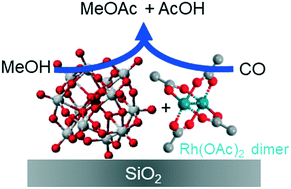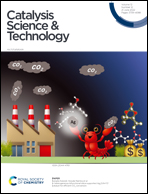Rhodium promoted heteropolyacid catalysts for low temperature methanol carbonylation†
Abstract
Acetic acid is a valuable industrial chemical obtained by the halide-free carbonylation of methanol, for which lower cost and more durable heterogeneous noble metal catalysts are desirable. Here, we report the use of a simple and cost-effective Rh acetate (Rh(OAc)2) precursor, either alone or in combination with phosphotungstic acid (HPW), to prepare silica supported monofunctional (Rh(OAc)2/SiO2) and bifunctional (Rh(OAc)2/HPW/SiO2) catalysts for methanol carbonylation. In isolation, Rh(OAc)2 is inactive for methanol carbonylation, only exhibiting stoichiometric acetic acid production from ligand release, and a low activity at 250 °C when combined with HPW in bulk form (acidity being required to protonate methanol). However, bifunctional Rh(OAc)2/HPW/SiO2 exhibits promising catalytic performance, with a TON of 70 and >90% acetic acid selectivity for 8 h on-stream without significant deactivation. In situ XAS and in situ DRIFTS measurements indicate that CO binding is activated by water loss from the acetate dimer, with geminal dicarbonyl bonding mode stabilising Rh(OAc)2 against reductive decomposition to Rh metal during the catalytic cycle. Temperatures ≥300 °C, or high methanol concentrations trigger irreversible loss of acetate ligands and rapid deactivation through Rh reduction.

- This article is part of the themed collection: In situ and operando spectroscopy in catalysis


 Please wait while we load your content...
Please wait while we load your content...